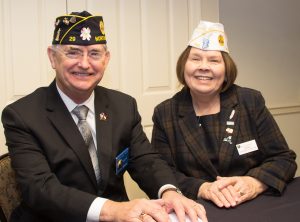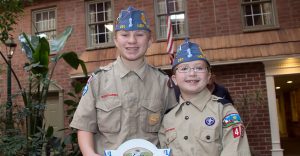Latest News
-
Thursday, January 25, 2018
Mid-Winter Conference Spotlight: Members, PTS Therapy and More
ALBANY — The 99th Mid-Winter Conference, held Jan. 19-21 at the Desmond Hotel and Conference Center, put a strong spotlight on several topics, such as membership and post-traumatic stress. It also offered a wealth of seminars and briefings on American Legion programs and services. [Mid-Winter photos] [Dept photo albums]
Members = Success

Dept. Commander Rena Nessler with banquet speaker Bill Oxford, trailing candidate for national commander (2019-2020).
Members were a focus for the Saturday evening banquet speaker, Bill Oxford, the man in line to become 2019-2020 national commander.
The American Legion is successful, he said, because its founding fathers created a strong foundation called the four pillars (helping veterans, promoting national security, mentoring youth and fostering patriotism).
Legion programs, along with the preamble to the its constitution, “are the building blocks of the foundation.”
Oxford, who hails from North Carolina, then asked: “What holds these building blocks together? What’s the glue, the mortar, the cement?”
He looked out at the 400-plus banquet attendees and said:
“You are the glue… You are the cement that holds this organization together.”

Sons of the American Legion members Samuel and Christopher Mozzillo staffed a Scouting booth at the Mid-Winter Conference, selling candy for Troop 43 (sponsored by Cairo Post 983). They belong to Greenville SAL Squadron 291. Photos by Robert Stronach.
He put it another way: “You are the bond that guarantees the success of The American Legion as well as its future.”
With the Legion on the verge of hitting its centennial year, he noted:
“Nobody in this room will be here to celebrate our 200th anniversary… If we believe in The American Legion, we’ve got to supply our successors.”
New PTS Therapy
Post-traumatic stress (PTS) gained renewed focus, thanks to a newly studied therapy known as the RTM Protocol with an apparent 90 percent success rate.
The Corning, NY-based Research and Recognition Project (founded by Dr. Frank Bourke) has been doing clinical trials with the RTM Protocol, and is now beginning to train VA and other counselors in its use. The Department of New York Executive Committee was so impressed that it voted to endorse it and recommend that the State of New York provide funding, Rehabilitation Field Coordinator R. Michael Suter told Sunday’s general session.
Based on Dr. Bourke’s groundbreaking work with survivors of the 9/11 attack on the World Trade Center, the RTM (Reconsolidation of Traumatic Memories) Protocol removes dysfunctional emotions (such as fear, helplessness, horror) from a traumatic experience, according to the project’s literature. It is a non-traumatic, non-drug cognitive therapy that removes nightmares, flashbacks and related emotional problems of PTS in several sessions. It’s a “relaxed imaging procedure” that “changes the way the brain remembers an event.”
Use Social Media
With the interest in building membership, the public relations sessions offered tips on making effective use of social media to publicize what the Legion does and to attract younger veterans. The strategy to use social media like Facebook is bolstered by focus group research with unaffiliated post-9/11 veterans conducted by Gramercy Communications, Gramcery’s David Doyle told attendees as he and Deirdre Hargrave offered a Powerpoint presentation on Facebook basics.
A couple of other highlights:
— Well over a hundred Legion Riders packed a large meeting room to discuss the successes and challenges of the motorcycle-riding chapters. State Director Dave Davis chaired the gathering.
— Navy veteran Gary Schacher, former membership chair for the Department of New York, got the chance to introduce himself as the leading candidate for 2018-2019 department commander. He served aboard ship in the Persian Gulf, and then later, as a reservist in the Seabees, he was twice recalled to active duty to serve in Iraq.